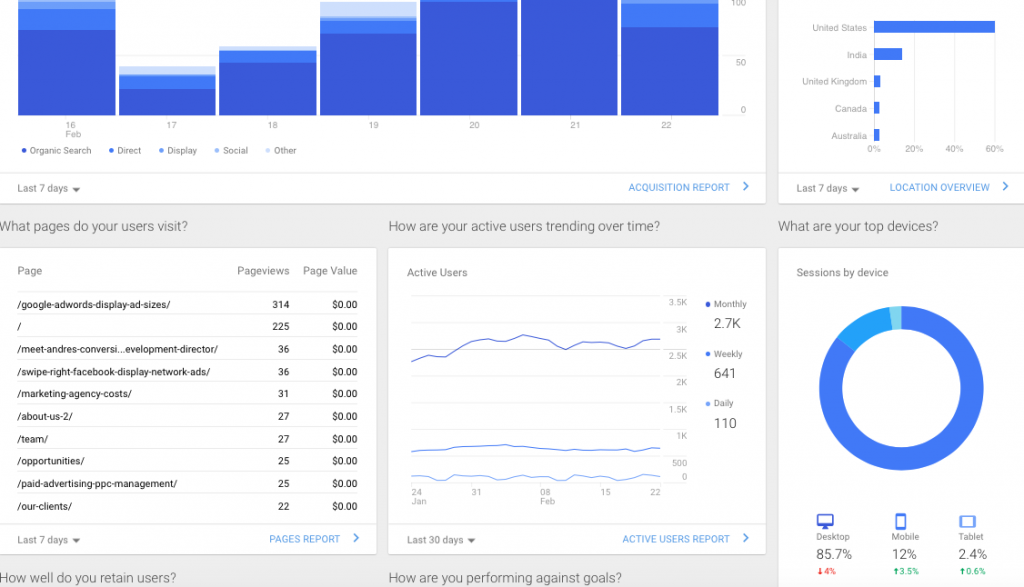HubSpot vs. Google Analytics: Which is a Better Tool For Reporting?

HubSpot and Google Analytics both provide businesses with valuable information about website traffic. Recently, there seems to be a lot of debate about which tool is better for website traffic reporting.
Some companies choose to use both HubSpot and Google Analytics together. However, these tools can contradict each other. In fact, it’s not uncommon for the numbers to not match up at all. When determining which tool is best for your business, it’s important to consider the size and needs of your company and what you re trying to measure.
HubSpot
HubSpot is marketing software designed to help companies manage their marketing efforts and nurture their leads through marketing automation. HubSpot measures website traffic, leads and conversions.
HubSpot contains multiple tools to help companies determine the activity of their visitors. Users can view where visitors are coming from, and what they do on your website. This gives you the tools necessary to understand and connect with both your potential and existing customers.
HubSpot is a paid subscription marketing service based on service and lead management. The more service options and leads your company has, the more your monthly subscription will be.
Google Analytics
Google Analytics is a reporting tool that provides specific information about visitors to your website. With Google Analytics, you can learn how visitors arrive at your website and how they interact with it. This helps a company learn about their website visitors and locate areas of their website that could benefit from improvement.

Reports provided by Google Analytics can be customized to see a wide range of information. This tool allows you to track leads and the source and medium of each lead (Google Organic, Google Paid, Facebook Organic, Facebook Paid, Referral ,Direct, etc.). One point of distinction is that Google Analytics is not a marketing automation platform like HubSpot.
Definition Of A Website Visit
Both HubSpot and Google Analytics report on “visits,” but each tool calculates “what a visit is” differently.
In HubSpot, a website visit is counted anytime someone reaches your website from an external website, direct visit, or in an email that took the visitor to your website.
In Google Analytics, a website visit is counted anytime someone reaches your website from a referring source but within a given time frame. Once the visitor is on your website, their activity is considered one visit until either 30 minutes of inactivity or the traffic source changes.
Comparing visits between the two analytic tools can be frustrating. In our experience, if the metric you want to measure is traffic by source & medium then Google Analytics is your preferred tool because the level of granularity is greater with that tool.
Which Analytics Tool Is Better?
Both tools provide benefits to companies of all shapes and sizes. While Google Analytics provides in depth data about the performance of your website traffic and ongoing digital marketing efforts, HubSpot can tell you more about the specific visitors on your website since it is managing ongoing email marketing efforts. This information is more beneficial to companies since HubSpot can tell you when specific visitors are back to your website so you can take follow up action with them. Google analytics does not have this feature since it is a analytics-based tool only.
Both tools can be used together to provide a wide scope of information. However, the two should not be compared but rather seen as an outside and inside look at your marketing efforts. For true data purists, Google Analytics provides a better and more in-depth analytics view of your website traffic than HubSpot. HubSpot will provide more granular user data since it is tracking IP addresses that matched an email address.
It’s important to consider your company’s needs and budget when determining which tool is best for your business. If you should have any questions on either of these two analytics platforms, please contact us.
- How To Fix the HTTPS “Not Secure” Message Appearing For Your Website - April 18, 2025
- Why Businesses Skip Chatbots On Their Websites - March 20, 2025
- How Chatbots Boost Website Lead Conversions - March 17, 2025
